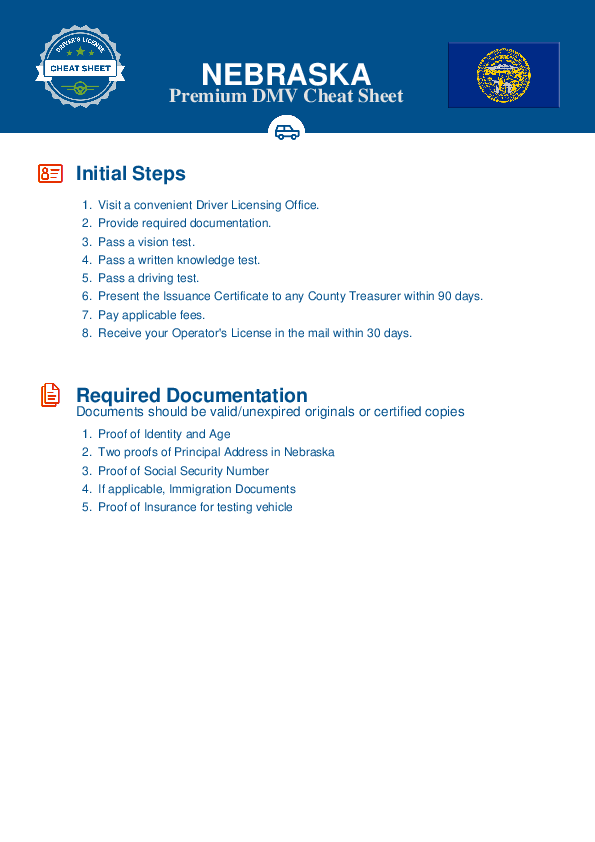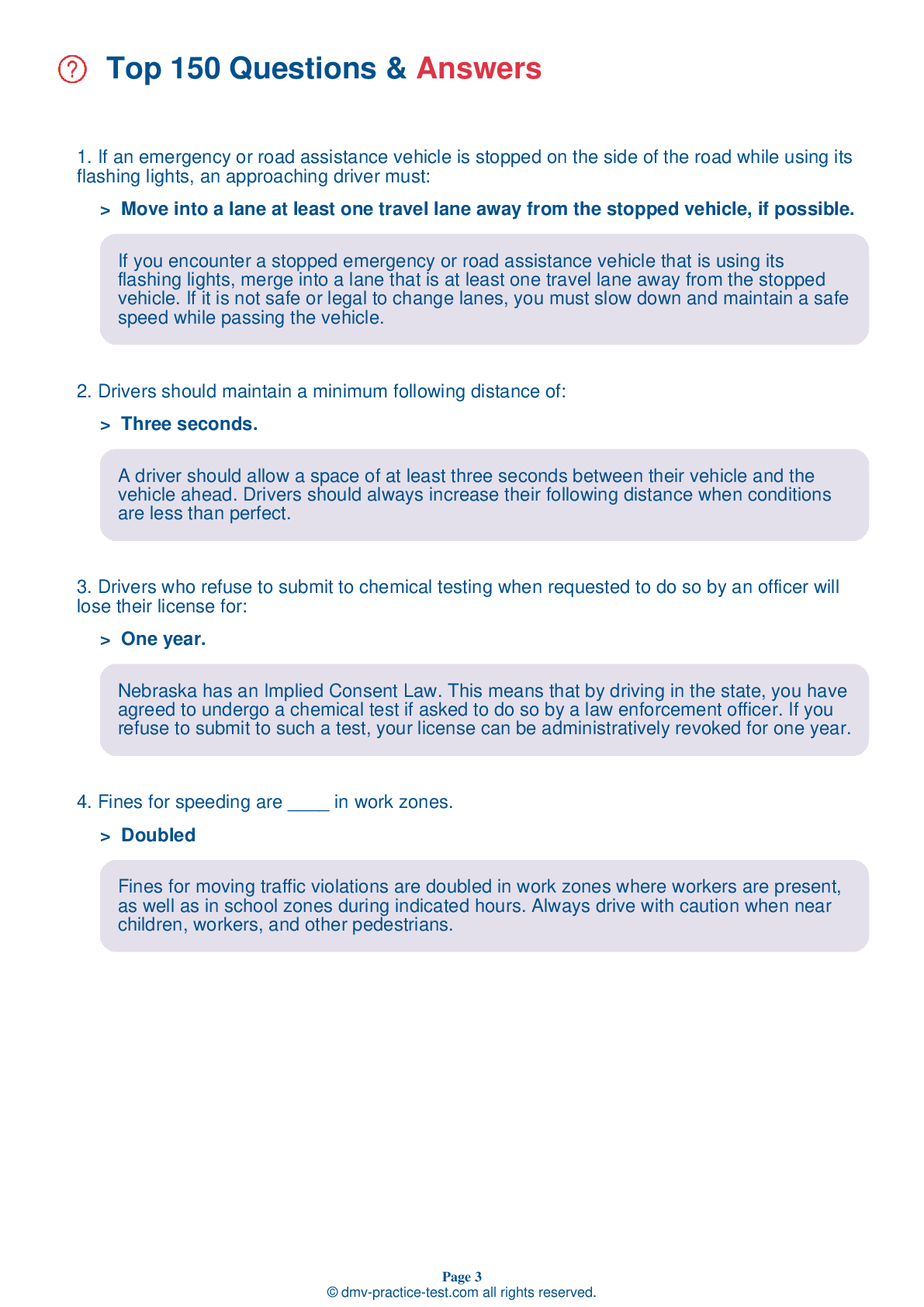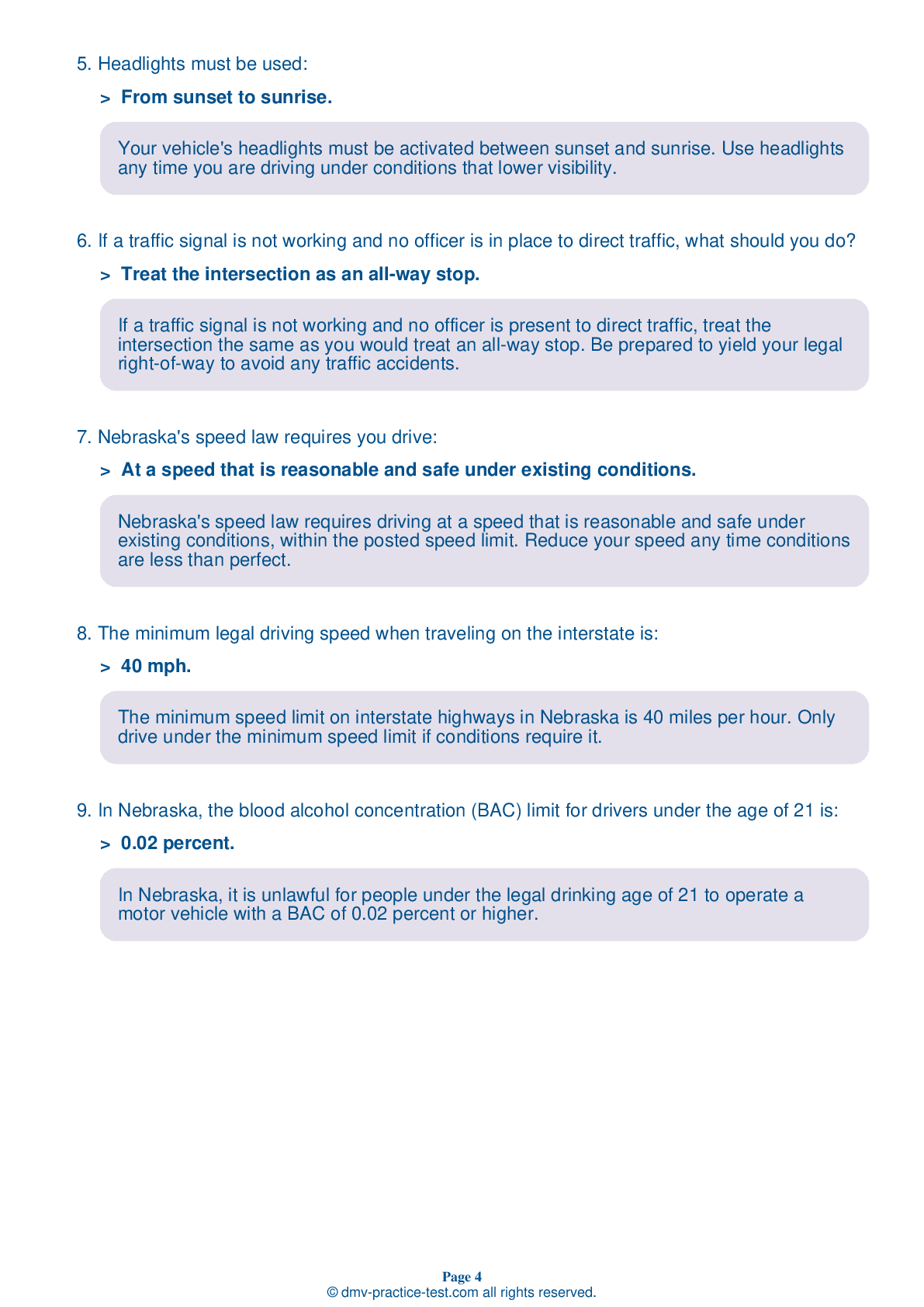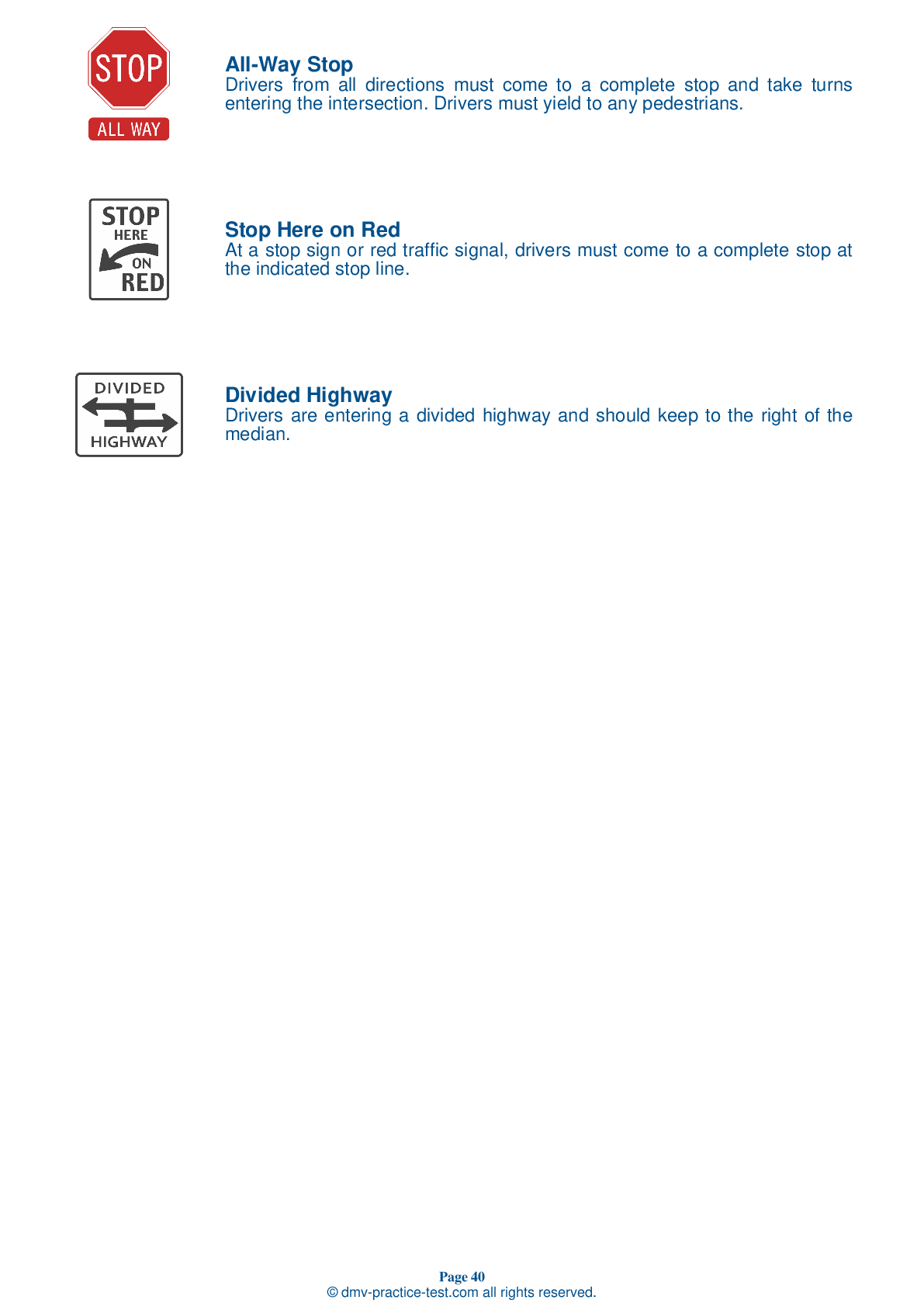DMV Permit Test #8
FREE Nebraska DMV Practice Test #8 Page 3 of 3
Take this FREE DMV Practice test (NE 2026) to check your qualification as a driver. To enhance your knowledge, download a DMV driver handbook, study theory, and practice for free on our website. Still worried about passing your test (driving license in Nebraska 2026)? Check our website for more sample tests, train as much as possible, and boost your grades!
25
20
24
17 . When you want to change lanes, you should never:
You should never change lanes within an intersection. Before changing lanes, always look over your shoulder to check your blind spot. Be alert to other drivers moving into the same lane.
18 . Which of the following driving skills are affected by the use of alcohol and/or drugs?
Any amount of alcohol acts as a depressant, slowing the function of the nervous system. It will reduce a person's alertness and ability to concentrate, increase their reaction time, and drastically reduce their coordination.
19 . If you are being passed in a no passing zone, you should:
Passing areas are based on how far ahead drivers can see. Allow the passing vehicle to re-enter the drive lane as easily as possible to help everyone avoid potential upcoming hazards.
20 . Hydroplaning occurs when tires ride on a thin film of water instead of on the surface of the road. To prevent hydroplaning in rainy weather, you should:
In rainy weather, you should lower your speed to reduce the risk of hydroplaning. Driving too fast may cause your tires to ride up on the water and lose contact with the surface of the road, making it very difficult to control your vehicle.
21 . Two solid yellow lines on the pavement mean:
Passing is allowed during daylight only.
Yellow lines tell you that the traffic on the other side of the lines is moving in the opposite direction. You should never cross two solid yellow lines to pass from either direction.
22 . A red arrow displayed on a traffic light means that:
A driver may turn in the direction that the red arrow is pointing.
Unless a posted sign indicates otherwise, a traffic signal displaying a red arrow means that drivers must come to a full stop and remain stopped until a green light or green arrow appears.
23 . You are coming to an intersection with a flashing yellow light. You should:
Prepare to stop; the light is about to turn red.
A flashing yellow light means that you should proceed through the intersection slowly and with caution. Scan your eyes across traffic in both directions.
24 . Fines for speeding are ____ in work zones.
Fines for moving traffic violations are doubled in work zones where workers are present, as well as in school zones during indicated hours. Always drive with caution when near children, workers, and other pedestrians.
25 . The effect that lack of sleep has on your safe driving ability is the same as:
The effect that driving with teenagers has.
Fatigue and being under the influence of alcohol have similar effects on your ability to drive safely. For example, being awake for 18 hours impairs your driving about as much as a blood alcohol level of 0.05 percent. Being awake for 24 hours in a row has the same effect on your driving as a blood alcohol level of 0.10 percent.
2026 Nebraska | Frequently Asked Questions
To obtain a driver's license in Nebraska, you need to provide proof of U.S. citizenship or lawful status, proof of Nebraska residency, and your social security number. You will also need to pass a vision test, written exam, and driving test. If you're under 18, you'll need a School Learner’s Permit (LPE) or School Permit (SCP) for at least one year.
In Nebraska, the cost for a new driver's license varies based on your age. For those aged 21 and over, the fee is $30.50. For those under 21, the fee is $26.50. Please note these fees are subject to change and additional costs may apply if you require testing or other services. It's recommended to check the current fees with the Nebraska DMV.
In Nebraska, the minimum age for obtaining a provisional operator's permit, which allows unsupervised driving under certain conditions, is 16 years. However, teenagers can start learning to drive at age 14 with a School Learner’s Permit (LPE) or Learner's Permit (LPD), but these permits require an adult in the car.
When applying for a driver's license in Nebraska, you need to present proof of U.S. Citizenship or lawful status in the U.S., such as a birth certificate or passport, proof of your Nebraska residency, and proof of your identity. Additionally, you will need to provide your Social Security Number. For those under 18, a parent or guardian's signature is also required.
To arrange a driving test in Nebraska, you need to visit the Nebraska Department of Motor Vehicles (DMV) website and schedule an appointment online. Alternatively, you can call or visit your local DMV office. You will need to provide your learner's permit number and other personal details. Remember, you should have already completed a driver's education course if you are under 18.
In Nebraska, to get a learner's permit, you must be at least 15 years old. First, you need to pass a written knowledge test at a local DMV office. Once you pass, you'll need to provide proof of identity, U.S. citizenship or lawful status, Nebraska residency, and your Social Security Number. Lastly, pay the required fee to receive your learner's permit.
In Nebraska, if you are under 18, you are required to complete a minimum of 50 hours of supervised driving practice. Ten of these hours must be at night. The practice hours must be certified by a parent, guardian, or licensed driver who is at least 21 years old. After this, you are eligible to take the driving test.
To prepare effectively for your driving test in Nebraska, start by studying the Nebraska Driver's Manual thoroughly. Spend ample time practicing driving with a licensed adult, focusing on areas like parallel parking, turning, and merging. Familiarize yourself with the vehicle you'll use for the test, including signals and controls. Lastly, get plenty of rest before the test day to ensure you're alert and focused.
Common errors during a driving test in Nebraska include failing to check mirrors regularly, not signaling or incorrect signaling, speeding, not understanding traffic signs, and poor parking. It's also crucial to maintain a safe following distance and be aware of pedestrians and cyclists. Remember to stay calm and focused throughout the test. Practice driving under different conditions and locations for better preparation.
Yes, in Nebraska, you are allowed to use your personal car for the driving test. However, it must be in good working condition, have a valid registration and insurance, and meet all legal requirements for safety. Make sure to check all lights, signals, brakes, and mirrors before the test to avoid disqualification.
If you don't pass the driving test in Nebraska, you will not be issued a driver's license. However, you can retake the test. There's a waiting period of one day before you can retake the written test, and a waiting period of three days before retaking the driving test. It's important to use this time to practice and improve your driving skills.
Yes, in Nebraska, newly licensed drivers under the age of 18 are subject to certain restrictions for the first six months. They cannot drive unsupervised between midnight and 6 a.m. unless for work, school, or a religious event. They also can't have more than one passenger who is under 19 and not an immediate family member. Violation of these rules can result in fines or license suspension.
No, you cannot apply for a first-time driver's license online in Nebraska. You must visit a Department of Motor Vehicles (DMV) office in person. However, you can renew or replace an existing license online if you meet certain eligibility requirements. Always check with the Nebraska DMV for the most current information.
Whether you can drive in another state with a Nebraska learner's permit depends on the laws of the state you're visiting. Some states may honor an out-of-state learner's permit, while others may not. It's important to check the specific driving laws of the state you plan to visit before driving there with a learner's permit.
In Nebraska, a regular driver's license is valid for five years. The expiration date is typically on the licensee's birthday. However, for those over age 72, licenses are valid for three years. Commercial driver's licenses (CDLs) have different validity periods. Always check your license for its specific expiration date.
Yes, you can renew your Nebraska driver's license online if you meet certain criteria. You must be a U.S. citizen, your previous renewal must have been completed in person, and your license must not be expired for over one year. However, you cannot renew online if you need to make changes to your license or need a new photo.
International students or foreign residents in Nebraska must first obtain a Social Security Number or a valid immigration document. They should then study the Nebraska Driver's Manual before taking the written test at a DMV office. Upon passing, they'll be issued a learner's permit. After practice driving, they can schedule a road test. Upon passing, they'll receive their driver's license.
A driver's license allows the holder to drive independently at any time, while a learner's permit requires the driver to have a licensed adult in the car at all times. Also, learner's permit holders may have restrictions on driving hours. In Nebraska, you can get a learner's permit at age 15 and a driver's license at age 16.
Yes, in Nebraska, to obtain a driver's license, you must pass a vision test. Your vision must be at least 20/40 in one or both eyes, with or without corrective lenses. If you need glasses or contacts to meet this standard, a restriction will be placed on your license requiring you to wear them while driving.
Yes, it is permissible to use a rental vehicle for the driving test in Nebraska. However, the driver must be listed as an authorized driver on the rental agreement. Additionally, the vehicle must be properly registered, insured and meet safety requirements. The examiner may refuse to test you if these conditions aren't met.
In Nebraska, if you fail the driving test, you must wait at least one day before retaking it. However, after three failed attempts, you'll have to wait at least 30 days before you can try again. It's recommended to use this time to practice and improve your driving skills.
To take the DMV written test in Nebraska, you need to provide proof of your identity, age, and residency. This can include a U.S. birth certificate, a U.S. passport, or a Certificate of Naturalization for identity and age. For residency, you can provide documents like a utility bill, bank statement or rental agreement.
Yes, Nebraska DMV offers the written test in several languages other than English. These include Spanish, Arabic, Russian, Vietnamese, Chinese, and others. However, it's advisable to contact your local DMV office in advance to confirm the availability of the test in your preferred language.
In Nebraska, if you fail the DMV written test, you are allowed to retake it the next day. However, if you fail it three times, you must wait at least 28 days before taking it again. It's recommended to study the Nebraska Driver's Manual thoroughly before retaking the test.
In Nebraska, if you fail the DMV written test, you must wait at least one day before retaking it. If you fail the test three times, you will be required to wait 60 days before trying again. It's recommended to study thoroughly before each attempt to increase your chances of passing.



